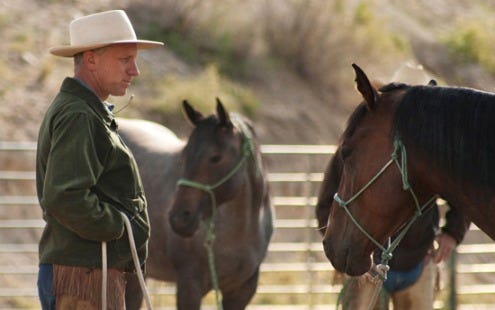Buck

In an early scene of "Buck," Robert Redford speaks of his initial doubt about Buck Brannaman — brought in to help Redford with his film version of "The Horse Whisperer" seeing as Brannaman was one of the novel's major influences. He arrived wearing his typical attire, Stetson and all. It could have been a gimmick, but Buck is the truest cowboy captured in a modern film.
He isn’t a gunslinger who will kiss a girl in the saloon. He is the cowboy who knows a simpler way of life and he even knows some impressive rope tricks. Most of all, he’s a man who understands horses on an unprecedented level. He treats them with kindness and respect. He compares it to parenting, but with an animal there isn’t a traditional sense of dialogue. Buck is able to interpret their actions to figure out what they’re feeling and responds to that with patience.
Buck travels around the country coaxing horses into a more agreeable state. In that way, he's like a magical guidance counselor — helping difficult horses but, more importantly, teaching owners to treat horses more gently. He doesn’t raise his voice or beat the animal, and the methods he’s incorporating are changing the way all horse trainers operate.
Cowboys are not always men of few words. They’re usually perceived as men with a lot to say; they just say it in a slower fashion. Buck easily spins down-to-earth metaphors into every aspect of people’s lives. The more he symbolizes the horse as a human, the easier it is to treat it gently.
Hearing about Buck’s childhood is one of the more difficult parts of the movie, as the relationship he had with his father was very abusive on many levels. Such an upbringing can cause a repetition in generations, but Buck is kinder because of it. The hatred of his father is so different from the rest of his worldview to the point where he almost refuses to give his father credit for his gentle personality.
A lot of credit should be given to director Cindy Meehl for not forcing a narrative into this documentary. All of the attention is spent trying to capture this man, and she does a successful job in always keeping it interesting. The rest consists of smaller moments and interviews where people speak about epiphanies and praise towards Buck. The interviews grow stale after so many in a row. It’s the exact opposite for seeing Buck work; every horse is a new thrill, and that’s why this movie is so easy to recommend.
